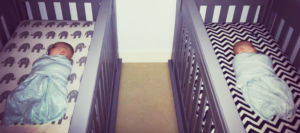This is probably the most commonly asked sleep question for parents, and unfortunately there isn’t an easy answer!
There are many factors involved when attempting to answer this question. It can depend on things like:
- How old is your baby?
- How much do they eat?
- How often do they eat?
- Were they premature?
- Do they have any health concerns?
But first, it’s important to understand how much newborns are supposed to sleep, and how that changes across the first few months of life.
How much do newborns sleep?
If you have a newborn, the answer is you cannot get them to sleep through the night. If your newborn does sleep through the night, this is not a good thing! You need to talk to your child’s pediatrician immediately. If you are struggling with feeds, reach out to a Certified Lactation Consultant. A newborn needs to eat every 2-3 hours, so sleeping through the night is not conducive to your baby’s growth or your breastmilk production if breastfeeding. A typical newborn is not going to be awake very often, only to feed and then cuddle for a few minutes before falling asleep again. So this means, yes, a typical newborn sleeps most of the day and night, but not several hours in a row. Like I mentioned, they need to be eating frequently, so after they feed (typically every 2-3 hours), they will sleep until they wake up hungry again. This means they may sleep for 1-2 hours at a time, then wake to feed.
 How much does a 3 – 4 month old sleep?
How much does a 3 – 4 month old sleep?
If your baby is 3-4 months old, it’s possible they may sleep through the night, but most do not quite yet. A 3-4 month old baby that is at least 12 pounds and eating well throughout the day, could give parents a 6-8 hour stretch at night. A baby’s ability to sleep this long at night is also dependent on their daytime feeding, activity, and nap schedule. At this age a baby’s circadian rhythm is ready to be set and they will thrive on a routine. This is the perfect time to reach out to a sleep consultant. Sleep training at this age involves very little crying and most babies are ready and willing to jump right into a sleep routine without much fuss!
How much do older babies sleep?
Some babies, even at 9 months, may not sleep a full 12 hours overnight without a feed. This is normal. Babies come in all shapes and sizes so we cannot expect them all to have the same needs or patterns. A smaller baby that eats less during the day is going to need more feeds in the night for a longer period of time. A larger baby that has big feeds during the day may start sleeping through the night much sooner than most.

Do I have to use Cry It Out?
Many parents, exhausted after months of sleepless nights, will resort to cry it out at this point. Please note, this is not necessary! No amount of crying will help a baby fall asleep if they are hungry and/or do not have a good daytime nap routine. Small amounts of crying are normal and necessary, but attempting CIO on your own with no other change to feeds or naps usually ends in frustration.
The problem with a question like this (How do I get my baby to sleep through the night?) is parents are often searching for a one-size-fits-all answer and there just isn’t one. That’s why a sleep consultant is so beneficial. They can assess your individual baby’s needs and your sleep goals to create the perfect sleep plan for your family. A sleep consultant that does not ask questions about your baby, your goals, or your parenting style and then doesn’t offer different methods to try based on your answers, is not going to be the most successful option.
As a sleep consultant, you can see why it’s so hard for me to answer this question with a blanket statement. I don’t know you or your baby to give you the best answer for your family. But I know you clicked on this link looking for help, so I’ll give you some very basic tips by age that will hopefully get you on the right path. You can also check out this blog post that lists my favorite sleep products!
Newborn Sleep Tips
From day 1 there are some things you can do to get into some healthy sleep habits early. That way, when your baby’s rhythm is ready to be set, it will happen easily because you’ve already been working on these habits.
-
- Put your baby to bed on a hard, flat surface (a crib or basinet). This is not only the safest place for them to sleep, but it gets them used to sleeping in the space where you ultimately want them sleeping later. They can sleep in your room near your bed for as long as you like, but this creates an easy transition when they are ready to be moved to a nursery. They just move along with the crib they are already familiar with.
- When you put your newborn down for a nap, make sure the room is dark, cool, and use a sound machine.
- When you wake your baby up, make sure to give them light. You’re unknowingly helping to set their natural circadian rhythm. High five!
- With newborns, focus on feeds. Don’t worry too much about how much sleep they’re getting and when, just make sure they are getting enough to eat and growing well!
- As your baby gets more efficient with feeds and can stay awake longer, see if you can separate feeding from sleeping. Make them two separate activities instead of always happing together. Eat, awake, sleep, repeat!
- One way to help soothe your baby to sleep without feeding is Shush Pat.
- In these critical newborn weeks, the support of an overnight postpartum doula can be so beneficial for parents. Mothers can heal, bond with baby, rest, and focus on feeding. Fathers or partners can get extra rest, learn newborn care tips, and ways to be supportive and helpful to a new mother. Postpartum doulas are there to offer judgment-free support to every family, day and night.

3-6 Month Sleep Tips
Like I mentioned above, around 3-4 months, your baby is ready for a more structured routine. Babies thrive on routine and even if you’re not a schedule-oriented person, you can figure out ways to have a routine instead of a schedule. The easiest way to do this is have a set wake time every morning, a set bed time every night, and try to get 3 naps in per day at around the same time.
-
- You still want to have your baby sleep in the dark and wake up to light.
- Feeds are still very important. A hungry baby doesn’t sleep for long.
- At this age your baby’s cries should be sounding different to you. Learning to listen to your child and understand what they are communicating to you is key to building a trusting relationship and is critical for sleep success.
6-12 Month Sleep Tips
If you’re still struggling with sleep at this point, don’t wait any longer to seek help from a professional and experienced sleep consultant. I promise you, the right sleep consultant will offer your family life-changing results and it won’t be scary! Find someone that listens to you!
-
- This is often when solids are introduced. As your baby eats more solids, milk feeds will decrease. This is normal.
- Don’t offer food at dinner first as this disrupts night time sleep while food digests.
- Routines are especially important at this age. Babies are really observant and knowing what to expect and when will help with nap time and bedtime.
12 months + Sleep Tips
For toddlers, sleep can become even more difficult if they never slept well as a baby. They are now walking and talking and can put up a fight for naps and night time.
-
- Routines are still crucial, if not more so now than ever! A toddler expects things to be the same each night.
- Set boundaries and stick to them. It’s important that all caregivers are on the same page.
- Don’t let your toddler stay up too late.
If you are struggling with sleep, we would love to speak with you! We offer virtual consults nationwide.
Alyssa Veneklase is a Certified Infant & Child Sleep Consultant and Co-owner of Gold Coast Doulas.





